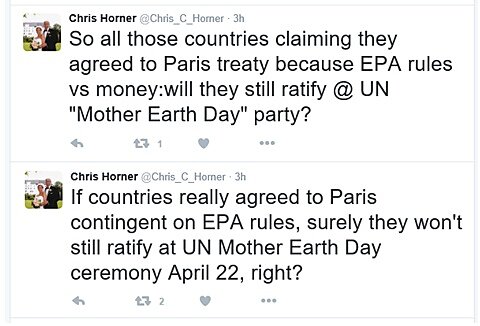You Ought to Have a Look is a feature from the Center for the Study of Science posted by Patrick J. Michaels and Paul C. (“Chip”) Knappenberger. While this section will feature all of the areas of interest that we are emphasizing, the prominence of the climate issue is driving a tremendous amount of web traffic. Here we post a few of the best in recent days, along with our color commentary.
—
The big climate news of the week is, of course, that the U.S. Supreme Court put a stay on the EPA’s Clean Power Plan until the Plan’s detractors have their day in court.
Cato’s Ilya Shapiro summarized the situation succinctly:
The Supreme Court’s stay of the Clean Power Plan is a welcome development. The regulations constitute an unprecedented assertion of agency authority — particularly the dubious invocation of Section 111 of the Clean Air Act to justify regulating power-plant emissions — so the Court had to step in to prevent irrevocable harm to the energy sector. As we saw last term in Michigan v. EPA, often it’s too late to fix administrative abuses judicially after the fact. Lawlessness must be nipped in the bud.
And this move may have foreshadowed the death knell of the Clean Power Plan altogether; the only question is whether the justices will have a chance to strike it down for good before the next president reverses it.
Lots has been written on it. In addition to Ilya’s, below is a sampling of others offering good insights. There are many more, and we apologize to those whose comments should have made this list but were left off (through negligence or space).
David Rivkin and Andrew Grossman: “Pulling the Plug on Obama’s Power Plan”
Jonathan Adler: “Supreme Court puts the brakes on the EPA’s Clean Power Plan”
Amy Harder and Brent Kendall: “Carbon-Rule Stay Puts Obama Environmental Legacy on the Line”
Wall Street Journal Editors: “A Supreme Carbon Rebuke”
Competitive Enterprise Institute: “Supreme Court Puts EPA’s Clean Power Plan on Hold”
Mike Bastach: “The Supreme Court Just Delivered A Crippling Blow To Obama’s Global Warming Agenda”
PBS Newshour: “Will a surprising Supreme Court move shake the Paris climate accord?”
While there are many interesting lines of discussion about the SCOTUS decision, one that is particularly intriguing is the impact that the Clean Power Plan stay will have on the adoption of the Paris Climate Agreement.
Coral Davenport’s story for The New York Times “Supreme Court’s Blow to Emissions Efforts May Imperil Paris Climate Accord” lays out the potential impact and is well-worth an entire read. Here’s a teaser:
But in the capitals of India and China, the other two largest polluters, climate change policy experts said the court’s decision threw the United States’ commitment into question, and possibly New Delhi’s and Beijing’s.
Competitive Enterprise Institute’s (CEI) Chris Horner adds that “Obama administration officials repeatedly told international community that Clean Power Plan ‘legally bulletproof’.”
Oops.
Horner goes on to wonder whether countries, since they were duped by the U.S., will now actually refuse to sign the Agreement at the U.N.’s big signing celebration scheduled in New York City on, you guessed it, Earth Day 2016, or whether they’ll just follow the money.
We’ll see (but we remain, like Horner, skeptical of any initial refusal…that’ll come later down the road when promised targets are being missed).
We also can’t help but wonder how this may effect another aspect of the U.N.’s Paris Climate Agreement—the requirement that the IPCC produce a report (in 2018) examining the climate impacts and feasibility of limiting total global surface warming since the pre-industrial period to 1.5C instead of the more common (but equally arbitrary) 2.0C (see Section II, paragraph 21, of the Agreement).
2.0°C is theoretically possible, with or without the Paris Agreement. It requires that the earth’s climate sensitivity be near the low end of mainstream assessments and business-as-usual economic/energy development around the world perhaps sped up a bit with a worldwide deployment of fracking technologies (see here ).
1.5°C is almost assuredly not. The world has already warmed up by about 0.9°C since about 1900 and there are probably still several tenths of a degree C of surface warming that is “baked in” the system. Those numbers add up pretty close to 1.5°C already. And, global temperatures are going to continue to rise as we emit carbon dioxide (in increasing amounts or not)—even if we expect the rise occur at a rate that is quite a bit slower than that being advertised by the world’s collection of climate models. The SCOTUS stay certainly isn’t going to help this situation.
The Paris Agreement requirement to examine a 1.5°C scenario is just wasted time and effort. But, that pretty much goes for U.N. climate conferences in general.

